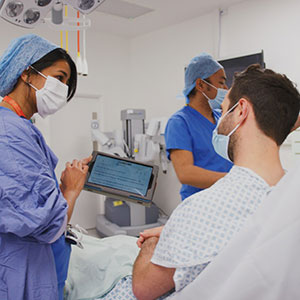How entrepreneurship in the NHS is helping to narrow healthcare inequalities
 Entrepreneurial NHS staff are being supported to develop and implement their innovations to help address healthcare inequalities and improve access, experience and outcomes for underserved populations.
Entrepreneurial NHS staff are being supported to develop and implement their innovations to help address healthcare inequalities and improve access, experience and outcomes for underserved populations.
The Clinical Entrepreneur Programme (CEP), delivered by Anglia Ruskin University, empowers healthcare professionals to transform services through innovation; equipping them with the skills and experience to scale their most innovative ideas for the benefit of patients, staff and the wider NHS.
Tackling health inequalities is at the heart of the programme with all clinical entrepreneurs encouraged to consider the impact of their innovation on diverse populations and how this may help overcome barriers experienced by Core20PLUS populations, for example people living in the most deprived areas, ethnic minority communities and inclusion health groups.
A great example of this is BlackandBrownSkin, a platform devised to showcase the signs of disease on darker skin. Founded by, Malone Mukwende, a medical student and member of CEP’s fifth cohort, the website seeks to support earlier and more accurate diagnosis for people of colour and increase confidence among healthcare professionals. Malone is also co-author of ‘Mind the Gap’, a revolutionary clinical handbook of the signs and symptoms of illness in Black and Brown skin which has now reached over 300,000 people in more than 110 countries and has influenced changes in the language used by NHS 111 call handlers to include descriptions of how symptoms may appear in different skin colours and ethnicities.
Clinical entrepreneur, Rachel Grimaldi has also developed a multi award-winning tool, CardMedic, which is supporting communications between healthcare staff and patients. The app, which features an A-Z collection of digital flashcards covering common healthcare topics, offers translations in over thirty languages. There is also the functionality to switch content to British Sign Language with subtitles for D/deaf users and is available in EasyRead with pictures for children, people with learning disabilities, aphasia or cognitive impairments. The app also has read-aloud for those with visual impairment or literacy issues. Currently the app has over 55,000 users and has been downloaded 22,000 times in over 120 countries.
Professor Tony Young OBE, National Clinical Lead for Innovation at NHS England and Professor of Entrepreneurship and Medical Innovation at Anglia Ruskin University said: “New innovations hold the potential to address barriers and challenges experienced by underserved communities and the Clinical Entrepreneur Programme is a great example of how the NHS can embed solutions which help to narrow healthcare inequalities The richness and diversity of our cohorts is helping us to find helpful and sustainable solutions which are making a real difference to the people we serve.”
Most recently, the CEP has partnered with Venture Studio from Crisis to support people experiencing homelessness (an inclusion health group that encounters extreme inequalities and social exclusion) to develop their entrepreneurial skills. In February 2022, four individuals who had experienced homelessness and had received business grants from Crisis Venture Studio, were welcomed on to the CEP. Receiving specifically designed mentorship, training and bespoke support, the entrepreneurs have been given the skills, guidance and knowledge to build and grow their business. The programme is a great example of how working in partnership, the NHS can help address the social determinants of health and support employment opportunities for those at risk of experiencing healthcare inequalities.
Laura Poppitt, a Birmingham-based artist, and Venture Studio from Crisis Entrepreneur is currently receiving mentorship to help develop her online business and to start an art therapy scheme to support people experiencing mental health difficulties. Laura said: “The NHS were incredible when I was in recovery from addiction, and I was eager to give back through the partnership with the CEP. The programme has had a big impact on me, and I have really enjoyed learning from speakers and entrepreneurs. It was incredible to meet NHS staff and innovators at the programmes pit stops and networking has helped me develop my ideas, inform people about my art and develop my business.”
In March 2023, CEP will begin its seventh cohort of the programme, and a further four places are available for entrepreneurs from Venture Studio; continuing the programme’s entrepreneurial outreach work.
Looking to the future
The CEP has an important role in tackling healthcare inequalities through innovation and works with colleagues across the NHS and wider healthcare industry as well as local communities to ensure equitable, access, experience and outcomes for all.
The CEP has a dedicated charter that embeds health inequalities and promotes equality diversity and inclusion in all aspect of programme delivery, from applications to education. The programme works with experts and organisation in health inequalities, to share learning, resource, and best practise. The CEP continues to collaborate with partners with the aim of develop a tool kit to gauge the impact innovations have in reducing health inequalities.
CEP is committed to providing equal access to opportunities and creates a safe and inclusive space to enable people to share and express their perspective and learn. The programme, which started in in 2016, has to date supported over 800 entrepreneurs.
You can find out more about the CEP on their website. www.nhscep.com
Entrepreneur profiles and case studies are also available including on projects to:
- implement inclusive antenatal education and place-based community asset workshops in deprived areas
- tackle health and education inequalities amongst young people in the most deprived areas of London
- Racially inclusive ear biometrics for diagnostics and monitoring – a new approach to pulse oximetry to help narrow healthcare inequalities experienced by people with darker skin
Venture Studio from Crisis has also published an Impact report which features the CEP.
